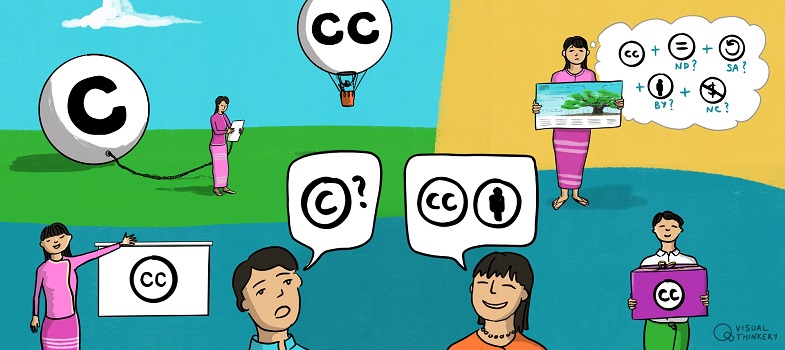Unit 5: Additional resources
5.3 Adapting and remixing CC-licensed work
More information about remixing and adapting resources
You can review the original remix table and read more here [Tip: hold Ctrl and click a link to open it in a new tab. (Hide tip)] and you may also find it useful to review the Open Oregon guide, Attribution Statements for Remixed OER Content.
You may also be interested in the following:
- Editor tools for building and remixing OERs in the Open Education Handbook.
- How to create and remix OER in the OEPS Becoming an open educator course.
- Remix tools created by Broward College Libraries.
- OER adoption tools and resources, created by the University of Louisiana at LaFayette.
- 80 OER tools from the Open Education Database.
- Audacity, an open source music editor.
- Information on finding reusable resources and reusing content from the GCU Library.
Here are some particular types of uses to consider (some of them should be familiar from earlier lessons!):
- Taking excerpts of a larger work. Read the relevant FAQ here.
- Using a work in a different format. Read the relevant FAQ here.
- Modifying a work. Read the relevant FAQ here.
You may also find the following sites useful:
- OER Africa (CC BY 4.0) is a website with resources and information to build understanding about OER and recommended OER practices.
- Distinguishing Between OER and All that Other Stuff on the Internet and Works Within Works, and collections by Maricopa Community College Faculty OER course (CC BY-SA 4.0): these two modules from the Maricopa Community College Faculty will help you understand differences between free, open access and OER, as well as citations and collections.
- BC Open Education Technology Collaborative by BCCampus (CC BY 4.0): if you are looking for inspiration on how to bring remixing and adapting resources to your classroom as an instructor, this group is a resource for you and the goals and group chat can be informative.
- ‘Tricky copyright scenarios: OER style’ by Maricopa Community College Faculty OER course (CC BY-SA 4.0): if you want to test yourself, this quiz about tricky copyright scenarios that apply to OER will help you understand better how to remix and adapt educational materials safely.
More information about creating and sharing OER
- CK12 OER (CC BY-NC 3.0): to create an open textbook with existing OER for K-12 education, visit this site, login as a teacher and click ‘Create new’.
- OER Faculty Workshop by Maricopa Community College Faculty OER course (CC BY-SA 4.0): for a deeper dive into the process of choosing the appropriate licences for educational resources, visit this OER course.
- ‘Creating open educational resources’ by the University of British Columbia (CC BY-SA 4.0): a video and information on considerations to make when licensing and sharing OER at higher education institutions.
More information about licence compatibility
- ‘Compatible licences’ by Creative Commons (CC BY 4.0): a page with information on which licences are compatible, how compatibility works and where there may not necessarily be compatibility between licences.
- ‘Wiki/ CC licence compatibility’ by Creative Commons (CC BY 4.0): more information on the CC licence compatibility chart.
- ‘Licence compatibility’ (CC BY-SA 3.0): a Wikipedia article on licence compatibility, including open licences that are not CC licences.
More scholarship about CC licences
Creative Commons Licences Legal Pitfalls: Incompatibilities and Solutions by Melanie Dulong de Rosnay at the Institute for Information Law at the University of Amsterdam & Creative Commons Netherlands (CC BY 3.0 NL): a detailed report on the more nuanced and legal aspects of incompatibilities that apply in a variety of international applications.
‘User related drawbacks of open content licensing’ by Till Kreutzer in Open Content Licensing: From Theory to Practice, edited by Lucie Guibault and Christina Angelopoulos (CC BY NC 3.0): a book chapter about some complicated issues that pertain to users of openly licensed materials (including CC licences).
More information about open pedagogy
- You may want to look at the Open Pedagogy Notebook, and review the work of Rajiv Jhangiani, Robin DeRosa, Catherine Cronin and Maha Bali to learn more about open pedagogy and open educational practices.
- You could also read a curation of posts on open pedagogy (#YearOfOpen) by Maha Bali and watch ‘What is open pedagogy?’, a video of different perspectives discussing the term ‘open educational practices’.
More information about accessibility
- Module 9: Accessibility by Open Washington: Open Educational Resources Network (CC BY 4.0): this module will help you design resources in a way that they will be accessible to all learners.
- Web Content Accessibility Guidelines (WCAG) 2.0 by the World Wide Web Consortium: a stable, referenceable technical standard that helps developers of any kind of online content (from websites to text and PDF files) to create or check their materials for accessibility. Many grant givers or governments (such as the European Union) even require institutions to follow those guidelines when publishing public sector information or education resources.
- Accessibility and Open Educational Resources by CAST Universal Design for Learning in Higher Education (CC BY-SA 4.0): the CAST project (Center for Applied Special Technology, which promotes universal design for learning) has a helpfuloverview and checklist for things to consider when designing educational resources, especially for postsecondary education.
More information about open policies
- ‘‘CC in schools’ by Creative Commons New Zealand (CC BY 4.0): more information on implementation of Creative Commons licences used in schools at the institutional level.
- BCcampus Open Education Working Group Guide by Lucas Wright and Krista Lambert (CC BY 4.0): a resource for librarians, staff and faculty who support or are supporting open education at their institution and are starting or running an open working group. This resource contains three sections to help users establish, run and sustain a working group.
- OER Policy Development Tool by Amanda Coolidge and Daniel DeMarte, Institute for Open Leadership Fellows (CC BY 4.0): an interactive tool for institutional policy development.
